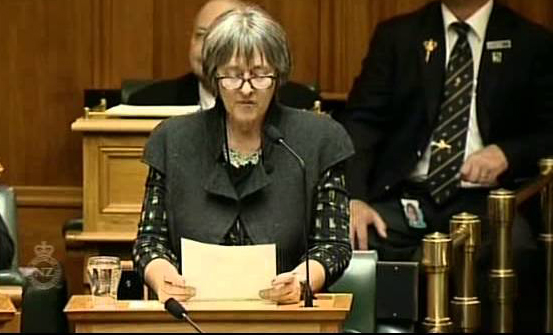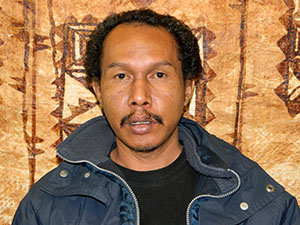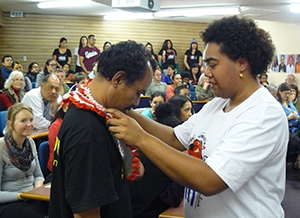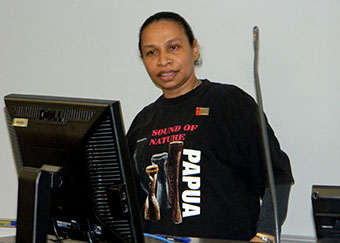
AUCKLAND (Pacific Media Watch): Indonesia's ban on foreign journalists, torture and sexual assault by the military, and the New Zealand government's cosy relationship with Indonesia - one of "colonisers talking to colonisers", according to a Mana Party spokesman - were discussed at a weekend seminar.
The Auckland seminar heard from Victor Mambor, thought to be the first West Papuan journalist to have visited New Zealand, West Papuan exile Paula Makabory, as well as Australian-based activists, academics, members of Parliament and political party candidates in the upcoming election.
Mambor told the audience about journalist Ardiansyah Matrais, who worked for Mambor's newspaper, Tabloid Jubi. Matrais was killed in 2010 by the Indonesian military, and found naked and handcuffed, having been thrown into a river.
Two other journalists - Leiron Kogoya and Marlon Mramra - had been killed in the last six years over stories they had written, one for covering a story about police who raped a civilian in the police station, Mambor said. In the same period, seven foreign journalists had been denied visas to West Papua and another five deported when they were caught by the military. Those foreign journalists who were allowed to report were assigned an Indonesian intelligence officer to tail them everywhere, whether they liked it or not, whose accommodation, food and transport costs were charged to the media organisation.
In the same period, seven foreign journalists had been denied visas to West Papua and another five deported when they were caught by the military. Those foreign journalists who were allowed to report were assigned an Indonesian intelligence officer to tail them everywhere, whether they liked it or not, whose accommodation, food and transport costs were charged to the media organisation.
To make matters worse, government funding was allocated to media organisations which agreed to write "something good" and the police had channelled funds directly to journalists who helped them cover up acts of violence by security forces, Mambor explained.
A new law amendment stipulates that local authorities would control the media, and that stories and broadcasts will have to be based on Islamic values, whereas most of the West Papuan population is Christian.
Stressful reporting
Independent New Zealand journalist Paul Bensemann, the only New Zealand journalist to have reported from West Papua in recent years, said the ban on foreign journalists meant that it was stressful reporting undercover from West Papua.
Constantly hiding from Indonesian police and intelligence operatives also meant that foreign journalists feared for the safety and wellbeing of their West Papuan sources, he said.
Maire Leadbeater of West Papua Action Auckland said the New Zealand government had "a long history of betrayal of West Papua".
The NZ government supported the colonisation of West Papua, first backing the Dutch colonisers in a bid to ensure that West Papua did not turn communist, and then after the invasion by Indonesia, deciding that New Zealand's basic long term interest was in the establishment and maintenance of a stable and friendly Indonesia, and that self-determination for West Papua was "only a slogan".
"Our policy is unfortunately still pretty much the same," said Leadbeater. The New Zealand government had resumed defence ties with Indonesia in 2007, refused to meet Benny Wenda in 2013 and banned him from speaking in Parliament.
Joe Collins, secretary of the Australian West Papuan Association said there was growing solidarity in Australia, with about a dozen solidarity organisations in existence, a large West Papuan community in Melbourne, a Morning Star football league and a successful freedom flotilla supported by indigenous Australians having been held.
Vast resources But Paula Makabory, a West Papuan exile living in Melbourne, cautioned that West Papua made up one quarter of Indonesia's land mass and had vast resources of nickel, copper, oil, gas and timber and so Indonesia was unlikely to willingly grant it independence.
But Paula Makabory, a West Papuan exile living in Melbourne, cautioned that West Papua made up one quarter of Indonesia's land mass and had vast resources of nickel, copper, oil, gas and timber and so Indonesia was unlikely to willingly grant it independence.
She said the indigenous West Papuan population had decreased significantly from 96 percent in 1971 to 59 percent in 2005, while the non-Papuan population had increased dramatically over the same period from 4 percent to 41 percent and so West Papuan cities were now mainly Indonesian.
The indigenous population was likely to be further decimated through attacks by Indonesian police and the military. 81 percent of households live in poverty because military attacks often see whole villages fleeing into the jungle where they live as refugees with no food, medicine, far away from their farms.
Nearly four million hectares of forest have been given to corporations for logging, further reducing natural resources.
Repression was still very real.
"Tanks will be used to stop peaceful rallies. Indonesian police that have been trained by the NZ government are using guns to stop peaceful rallies. Just for raising the Morning Star flag, the police will come at you. It is like soccer in a field. Just come and kick, this is after the training by the NZ police," Makabory said. Makabory showed photos of soldiers posing with a dead West Papuan, that the soldiers had taken to "show off their trophy". She also showed a photo of her brother with his intestines hanging out of his body.
Makabory showed photos of soldiers posing with a dead West Papuan, that the soldiers had taken to "show off their trophy". She also showed a photo of her brother with his intestines hanging out of his body.
"If you do this [kill West Papuans to use as 'trophies'] you will be promoted to high ranks," she said.
'Dismal record'
Pacific Media Centre director Professor David Robie said the New Zealand media had an "absolutely appallingly dismal record" in covering West Papua, with the exception of a few independent journalists and Radio NZ International.
The NZ mainstream media had "no tradition of independent international reporting", was dependent on foreign news agency services and had no dedicated foreign news editors who could make judgments based on their in depth knowledge of the situations of countries in the Asia-Pacific region, said Dr Robie.
He said the PMC had frequently run stories about the "black spot" lack of coverage on West Papua in the media and cited the 2011 Pacific Media Watch media freedom report in the region.
"The Pacific Media Centre has encouraged students to put a lot of attention into West Papua. We believe it is the major human rights issue in the Pacific but it is very hard to get that message across into mainstream media, so the only alternative is for independent media to do as much as it can," Dr Robie said.
He pointed out that foreign journalists based in Jakarta were granted permission to visit and report on any of Indonesias 17,000 islands, except for West Papua, and risked having themselves and their media organisation's news bureau expelled from Indonesia if they breached this.
Dr Robie showed statistics of how mainstream media virtually ignored West Papua.
He cited examples of how independent journalists reporting under cover had exposed realities in West Papua to the rest of the world and he praised the work of people such as SBS's Mark Davis and Fairfax Media's Michael Bachelard in putting Indonesia's new media policies to the test.
Repression techniques
Dr Elizabeth Stanley from Victoria University said the various techniques of repression used by Indonesia mirrored the abuses Jakarta had meted out in the former colony of East Timor, invaded by Indonesia in 1975.
Torture victims were nearly always civilians or rural farmers. The display of bodies was used to create fear. Repression took place through everyday social controls, curfews, searches, prevention of gatherings and training done by the New Zealand police had helped to further "normalise" militarised life.
Dr Stanley said that Victoria University was a provider of training to Indonesian police and when Indonesian dignitaries visited, the university vice-chancellor's office gave them a warm welcome. To make matters worse, many Indonesian officers who committed crimes against humanity in East Timor had now been transferred to West Papua.
Networks of spies and informers, and well funded militias who carried out abuses by proxy were other repressive techniques. The courts propped up this repression - only five of of 74 state killings between 1995 and 2005 made it to court.
Indonesia relied on foreign governments being reluctant to take a stand for West Papua for fear of jeopardising trade relations, such as the NZ government which recently proclaimed that Indonesia's dark days were over and that it was now a full blooded democracy.
The seminar had also invited all the political parties to present their positions on West Papua but only the Internet, Mana and Green parties showed up. All pledged their support for a free, decolonised West Papua, the release of all prisoners and an immediate end to torture.
The Mana Party's candidate for Mangere, James Papali'i, also slammed the New Zealand government.
"Our government seems to be collaborating with Indonesia. These are colonisers talking to colonisers. The situation is a shame, it is quiet and nobody knows about it," he said.
Several speakers referred to the "groundbreaking" cross-party parliamentary motion by Green Party MP Catherine Delahunty for a "free media" and in support of human rights in West Papua.
Visiting West Papua editor appeals for real 'open door' for foreign media
NZ Greens call for 'media freedom' in West Papua
VIDEO: New evidence of torture killings by Indonesia forces
This work is licensed under a Creative Commons Attribution-NonCommercial 3.0 New Zealand Licence.




